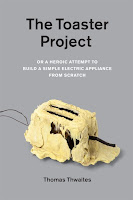Left to his own devices he couldn’t build a toaster. He could just about make a sandwich and that was it.
What an interesting book. Inspired in part by a quotation from The Hitchhiker's Guide to the Galaxy, the author decided to see if he could make a toaster from scratch. By which he meant finding and processing all the raw materials, not just assembling parts. He uses the Argos value toaster, priced at £3.94, as his template and soon realises just how complex it is. Each of the 404 separate components needs its own raw materials and manufacturing process. As he says, manufacturing a product is like watching a film of a glass being smashed, played backwards: the pieces fly in from different directions on cue and magically combine to make a perfect glass.
Next he travels to a mine in Wales and returns home with a suitcase full of iron ore. Then in his back garden he sets about smelting his own iron from which he hopes to make parts for the toaster. Similarly he makes copper wire from scratch, as well as the heating elements (using a sheets of a glass-like mineral called mica) and, perhaps least successfully, he makes plastic from raw materials.
This all seems a bit barmy but the author is making some serious points. Given the raw materials and the number of complex processes involved, how is it possible for Argos to sell a toaster for £3.94?
And the answer is that the price doesn't reflect the true cost at all. The mining of the metals and minerals will have undoubtedly caused pollution in a far away land, as will the manufacturing processes. But, when buying our toaster for £3.94, we don't contribute towards the cost of cleaning up, let alone the investment which could avoid the pollution in the first case.
So we are reminded of the uncomfortable tension between our way of life, which involves buying things as cheaply as possible to make our hard-earned money go further; and the certain knowledge that by buying cheap imported goods we are impoverishing people and their environment in other countries. But we (literally) don't see that.
And all because we want our bread browned evenly on both sides.
What an interesting book. Inspired in part by a quotation from The Hitchhiker's Guide to the Galaxy, the author decided to see if he could make a toaster from scratch. By which he meant finding and processing all the raw materials, not just assembling parts. He uses the Argos value toaster, priced at £3.94, as his template and soon realises just how complex it is. Each of the 404 separate components needs its own raw materials and manufacturing process. As he says, manufacturing a product is like watching a film of a glass being smashed, played backwards: the pieces fly in from different directions on cue and magically combine to make a perfect glass.
Next he travels to a mine in Wales and returns home with a suitcase full of iron ore. Then in his back garden he sets about smelting his own iron from which he hopes to make parts for the toaster. Similarly he makes copper wire from scratch, as well as the heating elements (using a sheets of a glass-like mineral called mica) and, perhaps least successfully, he makes plastic from raw materials.
 |
| Manufacturing is like watching a film of a glass being smashed, played backwards |
And the answer is that the price doesn't reflect the true cost at all. The mining of the metals and minerals will have undoubtedly caused pollution in a far away land, as will the manufacturing processes. But, when buying our toaster for £3.94, we don't contribute towards the cost of cleaning up, let alone the investment which could avoid the pollution in the first case.
So we are reminded of the uncomfortable tension between our way of life, which involves buying things as cheaply as possible to make our hard-earned money go further; and the certain knowledge that by buying cheap imported goods we are impoverishing people and their environment in other countries. But we (literally) don't see that.
And all because we want our bread browned evenly on both sides.
